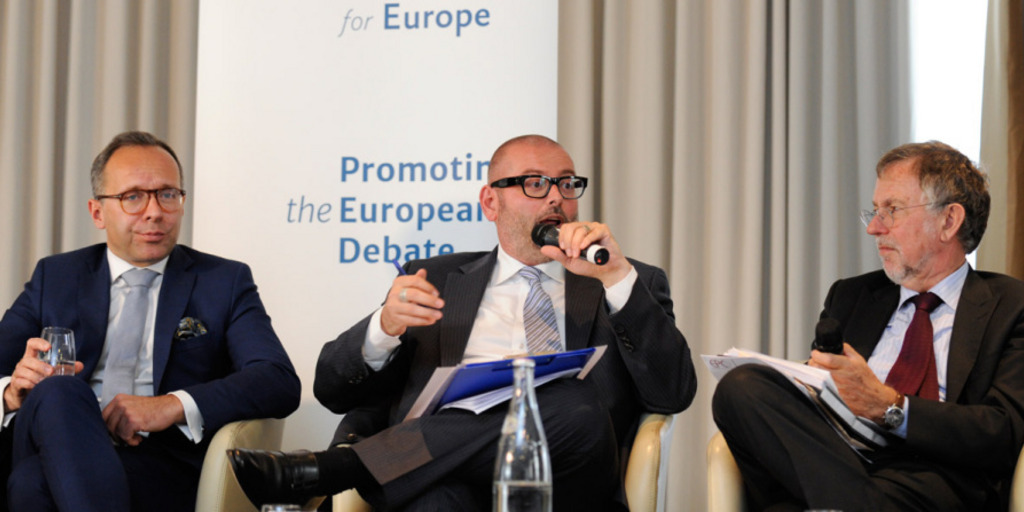The New Pact for Europe, an initiative which is supported by a transnational consortium of foundations and think tanks, has published its second report entitled "Towards a New Pact for Europe". The report identifies two interlinked strategic challenges that the EU is currently facing: firstly, those posed by economic, social and political divisions within and between countries, leading to increased fragmentation, and secondly, the growing perception in many EU countries that European integration is no longer beneficial for everyone. It argues that simply consolidating past achievements will not be enough. Instead, closer cooperation will be indispensable if Europe wants not only to overcome the immediate crisis, but also to create fresh momentum that will allow it to exploit more of its potential and meet citizens' needs and expectations.
Therefore, the partners of the initiative propose a New Pact between the EU, Member States and citizens. This pact should rest on three main pillars: an Enabling Union, a Supportive Union and a Participatory Union. Furthermore, the supporters of the initiative call for a new grand project balancing the interests of the Member States and different groups within them.
1. An Enabling Union should foster sustainable economic growth and job creation by stimulating public and private investment both at European and at national levels. It should promote social investment and enhance Europe's overall competitiveness by supporting structural reforms, especially in countries that are lagging behind, while remaining on the path towards fiscal consolidation. Measures to strengthen and transform national economies will enable Europe to realise its combined growth potential. This is in the interest of all EU countries irrespective of how well or badly they have weathered the crisis storm.
2. A Supportive Union should enhance the EU's 'caring dimension' to address concerns that the crisis has hit some countries and social groups exceptionally hard, fuelling a sense of social injustice within and between Member States. The potential measures foreseen under this pillar would send a clear signal to European citizens that efforts to reform national economies and social systems will always have to respect minimum social standards and will not lead to a 'race to the bottom'. Instead, a social compact including social convergence criteria and more specific measures to support those suffering most from the crisis would flank efforts to promote Europe's economic competitiveness.
3. A Participatory Union should strengthen the ties between the EU and its citizens by increasing its democratic legitimacy. The focus should not only be on traditional issues such as the powers and role of the European Commission and Parliament, but also a) on expanding the opportunities for frank discussion within Member States and between citizens from different EU countries; b) on mechanisms to strengthen the public’s direct involvement in the EU policy debates; c) on ways to enhance the role of national parliaments; and d) on expanding schemes that enable people to experience the direct benefits of EU membership.
In addition to these three main pillars, the EU should heed the lessons of history and seek to identify and implement a new 'grand project'. In the current political and economic climate, an Energy Union appears to offer the greatest potential to demonstrate the EU's advantages and deliver genuine benefits for the Member States and citizens.
This second report of the New Pact for Europe project aims to feed into the on-going discussions about the Union’s future as the new EU leadership team takes charge. The report is based on the input provided through 50 debates that took place in 17 EU Member States targeting different groups: randomly selected citizens, policy-makers, young Europeans, stakeholders and media representatives. It aspires to contribute to the debate on how to introduce ambitious but workable and realistic reforms to make the EU more effective in responding to the challenges Europeans are facing. The report will now be discussed in a number of Member States with policy-makers, EU experts, stakeholders and citizens. The outcome of this process will impact the future progress of the New Pact for Europe initiative.
The report 'Towards a New Pact for Europe' can be downloaded here.
About the New Pact for Europe:
The New Pact for Europe project was launched by the King Baudouin Foundation and the Bertelsmann Stiftung and is supported by a large transnational consortium including the BMW Foundation, Calouste Gulbenkian Foundation, European Cultural Foundation, European Network of Foundations, European Policy Centre, Joseph Rowntree Charitable Trust, La Caixa Foundation, Stiftung Mercator, Open Estonia Foundation, Open Society Initiative for Europe, and the Swedish Cultural Foundation. Its Advisory Group is made up of prominent Europeans from the worlds of politics, business, academia, and civil society.
More information about the initiative is available at www.newpactforeurope.eu



